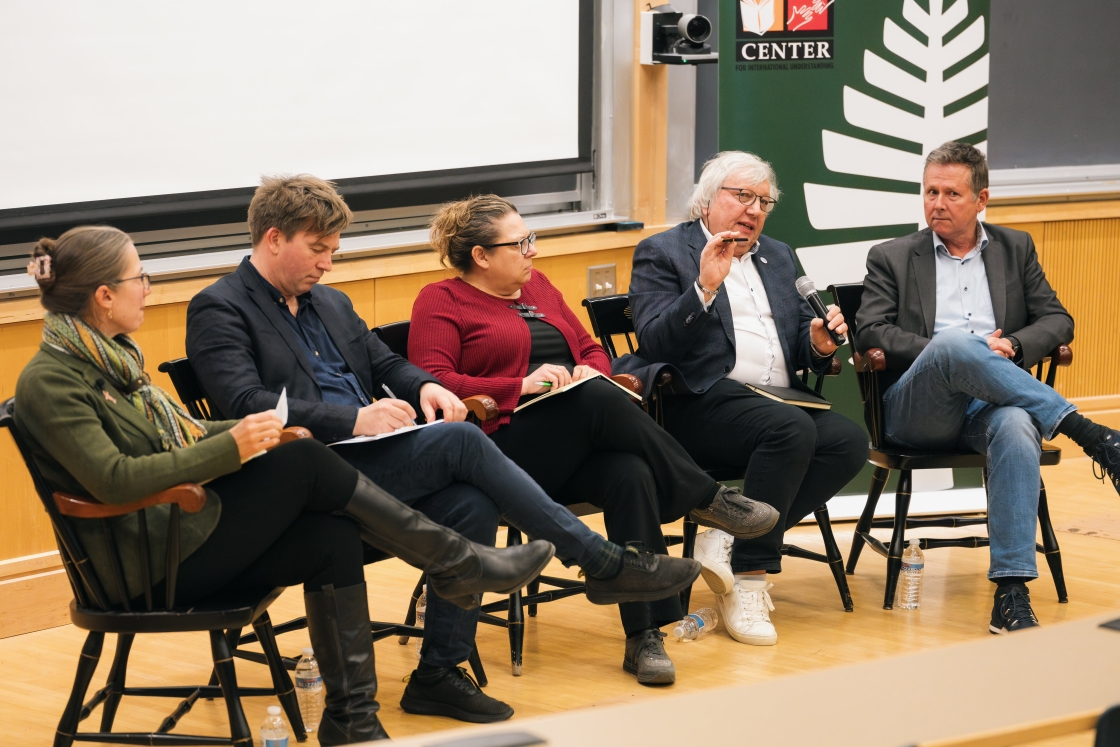Nelson Mandela, the first black president of South Africa, is remembered by members of the Dartmouth community as a courageous leader and the symbol of a new era for his country. Mandela, whom The New York Times called “an international emblem of dignity and forbearance,” died Thursday. He was 95.
Religion Department Chair Randall Balmer, the Mandel Family Professor of Arts & Sciences, says Mandela’s life “gives us reason to believe that, over the course of time, goodness and justice will be vindicated.”
“It’s important to recall not only Mandela’s 27 years in prison, but also that both Margaret Thatcher and Ronald Reagan branded him a terrorist,” says Balmer. “Martin Luther King Jr. was fond of quoting Theodore Parker: ‘The arc of the moral universe is long, but it bends toward justice.’ Nothing better demonstrates that maxim than the life of Nelson Mandela.”
Dartmouth President Phil Hanlon ’77 says the entire Dartmouth community mourns Mandela’s passing.
“Thanks to his stalwart commitment to freedom and justice, Mr. Mandela leaves the world a much better place than he found it. His legacy will endure for generations as a beacon of hope for all mankind.”
Daniel Benjamin’s time as a speechwriter for President Clinton began and ended with Mandela. On October 3, 1994, Benjamin—now director of the John Sloan Dickey Center for International Understanding—arrived for his first day at the White House the same day the newly elected Mandela arrived for a state visit. Almost four years later, on his last trip with Clinton, Benjamin dined with black African leaders and white Afrikaners—the ethnic group that decades earlier rose to power and enacted the segregationist laws known as apartheid.
“We were at Verglegen, the beautiful 300-year-old Western Cape wine estate where the African National Congress had years earlier held its first ‘unbanned’ meetings, and there was not a discordant note. I remember sitting at a table with ANC leaders and Afrikaners from top echelons of the security services. It was difficult to wrap one’s mind around all the change that led to that juxtaposition, but there was Mandela presiding over this vast event with his characteristic smile and perfect sovereignty,” recalls Benjamin.
“Clinton seemed to tower over other heads of state he met, but there were two exceptions. One was Yitzhak Rabin, who had faced a crisis that threatened the very existence of his country when he was chief of staff of the Israeli Defense Forces on the eve of the Six Day War. The other was Mandela, whose 27 years in prison on Robben Island and unwavering determination in the face of the South African regime put in him in a class by himself. In the case of Mandela, everyone who came in contact with him recognized that he was a man apart, someone who had faced incomprehensible challenges and, like only a handful of individuals in the last century, changed history.”
Robert Baum, professor of religion and African and African American studies, says Mandela’s “profound understanding of racial injustice and his commitment to a nonracial society became an inspiration to generations of South Africans. He quickly became a symbol of the new South Africa.”
Mandela’s ability to forgive those who imprisoned him for his fight against apartheid is one of the most compelling parts of his story.
“How someone could emerge from 27 years of prison with so little rancor, to become the moral center of his nation as it rebuilt itself, is a testimony to the nobility of the human spirit,” says Baum. “The father of an independent South Africa will be sorely missed. To the extent that his life serves as a model for others, South Africa, Africa, and the world will be a better place.”
Nelson Kasfir, professor of government emeritus and an expert on African politics, says Mandela “will be remembered longest for his willingness to forgive his captors in order to achieve reconciliation and the recognition of human dignity of all people in South Africa.”
Kasfir has visited South Africa twice. On his first journey, in 1994, he heard Mandela give a campaign speech just before he became president. Kasfir says Mandela “should also be remembered for his willingness to voluntarily retire after one term as president and not attempt to interfere in policymaking after that.”
Feyaad Allie ’16 spent last summer in South Africa working in the rural village of Gottenburg, teaching high school students how to apply to university. One day, he and classmate Peter Saisi ’16 went to Pretoria where they found city dwellers decorating the entrance to the hospital where the ailing Mandela had been a patient for many weeks.
“The gate of the hospital was decorated with countless posters, cards, and flowers from individuals, companies, schools, and organizations. This was a true indication for me of the love that the South African people have for Mandela. Many of the decorations included notes referring to Mandela as ‘Tata,’ which means father. Others called him a hero or savior. I witnessed local high school students speak about how important Mandela was to their country because he worked endlessly for their freedom,” says Allie.
In the midst of the outpouring of concern for the ailing Mandela, Allie found himself being interviewed by a BBC reporter.
“I explained that Mandela’s courage, dedication, and integrity was unique,” he told the reporter. “And it’s unlikely there will be another leader as influential and honorable as him.”

